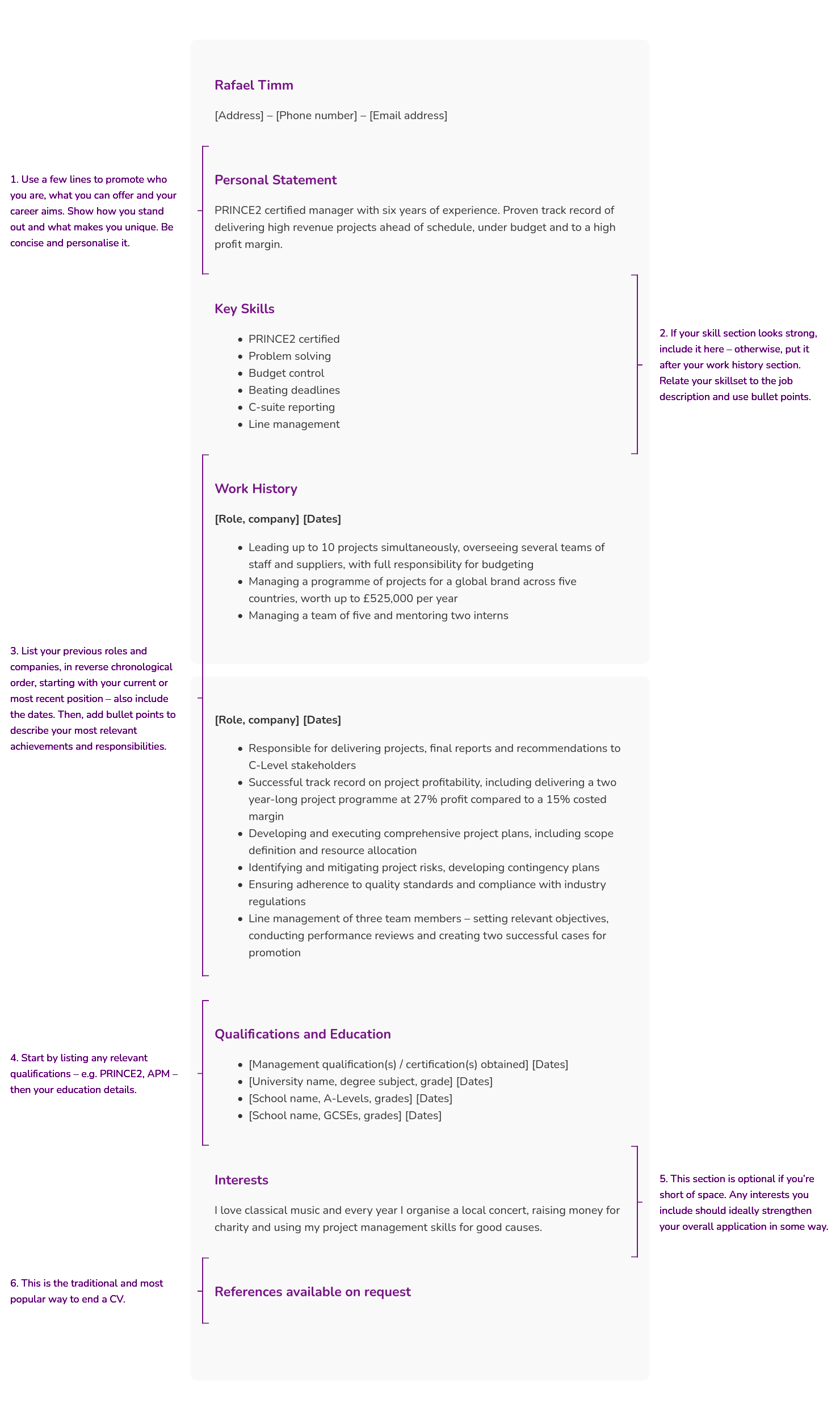If you’re unsure about how to write a management CV, we’ll explain all you need to know in this guide.
Management in the world of work encompasses a wide range of roles – but whether you’re writing a project management CV or one for senior leadership jobs, we’ve got you covered.
There’s always a need for good project managers and the pay can be attractive. Nearly two thirds (65%) of project managers saw their pay increase in 2022, based on a survey from YouGov and the Association for Project Management (APM).
According to the National Careers Service, the average salary for entry level project management roles is £28,000, rising to an average of £75,000 for experienced employees.
Now let’s take a look at how to write a top-notch management CV.
The basics of a great project management CV
Start with the basics. As there are several different types of CV, you need to decide which one is right for you.
Either way, use a clear layout and avoid complicated formatting on your CV.
If you have a master CV, you’ll want to make a copy and then tailor it to the job description. If you want to start from scratch, here’s our comprehensive guide to writing a CV.
Need to send your CV soon? Make sure you leave enough time to triple-check it for any mistakes! Nothing looks more unprofessional than an error on your CV.
And if you need some examples of outstanding CV headlines or how to write the perfect CV ending, we’ve got you covered.
Manager CV skills
Whether you’re writing a project management CV or one for a different role, the job advertisement you’re responding to will likely cite hard and soft skills that are either required or desired.
Including a key skills section is one way to show employers you have these. Alternatively, you can work your skillset into your personal statement and/or career history section if you prefer.
Adding the right skills may help your project management CV bypass applicant tracking system (ATS) software.
Relevant hard skills could include expertise in a project management methodology – for example PRINCE2, Waterfall, Scrum, Agile and so on.
A project management CV often mentions some of these skills too:
- Deadline management
- Budgeting
- Risk management
- Negotiating
- Supplier management
- Troubleshooting
- Team management
- Procurement
- Data analysis
This should go without saying, but it is illegal to lie on your CV. In other words, don’t claim you have skills that you haven’t learnt yet – you will be caught out eventually.
The skills you need to showcase will be a little different for a senior management role. When you’re several rungs up the career ladder, it’s more likely that the skills you’ll be writing about will include:
- Company growth
- Change management
- Commercial acumen
- People management
- Strong leadership
- Department management
- Strong communication
- Stakeholder management
In most cases, you’ll need to demonstrate evidence of your skills and we’ll cover this later.
Some of your skills will be more useful for the role than others, so think about which ones are most relevant.
Support your claims with evidence
Show some statistics on the CV to demonstrate your impact in previous roles.
As a project manager, outline your involvement in different projects and greatest successes. In senior management, how have you contributed to a company’s success?
Also mention how many staff you’ve managed, or how many client accounts you’ve looked after and so on.
Always include relevant financial examples too, such as an efficient use of a budget or sales figures you can directly attribute to your management.
These statistics or facts and figures will stand out more in the right context. To explain your best ones, use the STAR method and ensure you’ve covered the:
- Situation: This should be clear from the company or your job role
- Task: The objective to meet or challenge you needed to solve
- Action: How you addressed the issue, as precisely as possible
- Result: The success of your management, using statistics if possible
A strong project management CV features several concrete examples to substantiate your claims. They can sound too generalised otherwise and employers may find it difficult to tell how you stand out compared to other applicants.
If you want to give a long or complex STAR example and don’t have enough space on your project management CV, add it to your supporting statement instead. Alternatively, take the time to write a cover letter that makes you stand out.
Want to see the above in practice? Here’s a project management CV example to get you started:
Project management CV example

Summary: How to write a management CV
Start with the basics of your management CV – career history and education. Then include the right skills, tailored to the job description.
Use some facts, figures and statistics to give concrete examples of your achievements and claims.
Spend a good amount of time on your personal statement. Hiring managers have plenty of candidates to assess, so make sure you have a strong opening to hold their attention – otherwise, they may not read the rest of your CV!
And if you want some support, we offer a CV writing service! We’ve written plenty of management CVs before, for beginners and boardroom executives alike – please contact us for more details.


